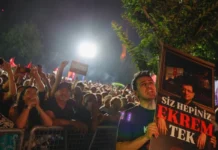Activists campaigned on social media over the weekend to spotlight the dire consequences of politically motivated trials in Turkey, emphasizing the severe impact on children’s mental and physical health.
While these trials affect men and women of all ages, the repercussions for children have been particularly devastating, with reports of severe emotional distress and even suicides.
One such case is Özlem Sarıçelik, a Turkish teacher imprisoned in Eskişehir since September 2020 over her alleged links to the faith-based Gülen movement. Her husband, Zekeriya Sarıçelik, a former mathematics teacher, was also jailed on the same grounds in 2017. Their daughter, Elif Sinem, who has Down syndrome, has been under the care of her grandfather, Hüseyin Sarıçelik. However, after he suffered a heart attack in June 2023, Elif was left without proper care, exacerbating her emotional and physical challenges.
Similarly, Esra Ekmekçi, the mother of a 9-year-old autistic child named Tarık, was imprisoned a year ago in Erzincan over her alleged membership in the Gülen movement. Her husband, Talip Ekmekçi, has also been incarcerated since 2017 on similar grounds. In the meantime, Tarık is being cared for by his grandmother in a rural village in Samsun, far from the specialized care he needs. Tarık’s health has deteriorated significantly over the past year.
Turkish President Recep Tayyip Erdoğan has been targeting followers of the Gülen movement, a faith-based group inspired by Turkish cleric Fethullah Gülen, since the corruption investigations in 2013, which implicated then-prime minister Erdoğan, his family members and his inner circle.
Dismissing the investigations as a Gülenist coup and conspiracy against his government, Erdoğan designated the movement as a terrorist organization and began to target its members. He intensified the crackdown on the movement following a coup attempt on July 15, 2016 that he accused Gülen of masterminding. Gülen and the movement strongly deny involvement in the abortive putsch or any terrorist activity.
There have been reports of minors dying by suicide after their parents were imprisoned, unable to cope with the emotional strain. Others have spent their formative years inside prison walls, accompanying mothers serving their sentences, deprived of a normal childhood and the stability necessary for healthy development.
Onur Selim Y., a 20-year-old university student living and studying in the northeastern Turkish province of Erzurum, died by hanging himself from a pipe. His father, a biology teacher identified only by the initials T.Y., has been sentenced to more than six years in prison on charges of links to the Gülen movement.
Since the failed coup attempt in 2016, Turkey has seen an increase in the number of women with sick children being incarcerated, although no official data exist on the precise number of children affected. Activists emphasize that the post-coup purge has exacted a significant toll on children. There are reports that several children have succumbed to their illnesses while their parents were incarcerated on terrorism-related charges.
In 2021 the Turkish Parliament removed from a bill an article postponing the prison sentences of mothers with children under 15 years of age whose husbands are also in prison.
The article was part of a proposal aimed at making improvements to the law on the execution of sentences. The bill was approved by the legislature after the article was removed. The amendment would have reunited some 3,000 imprisoned women with their children.















